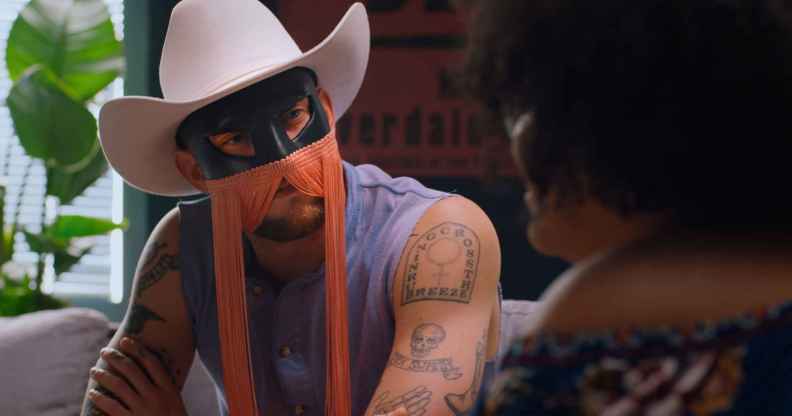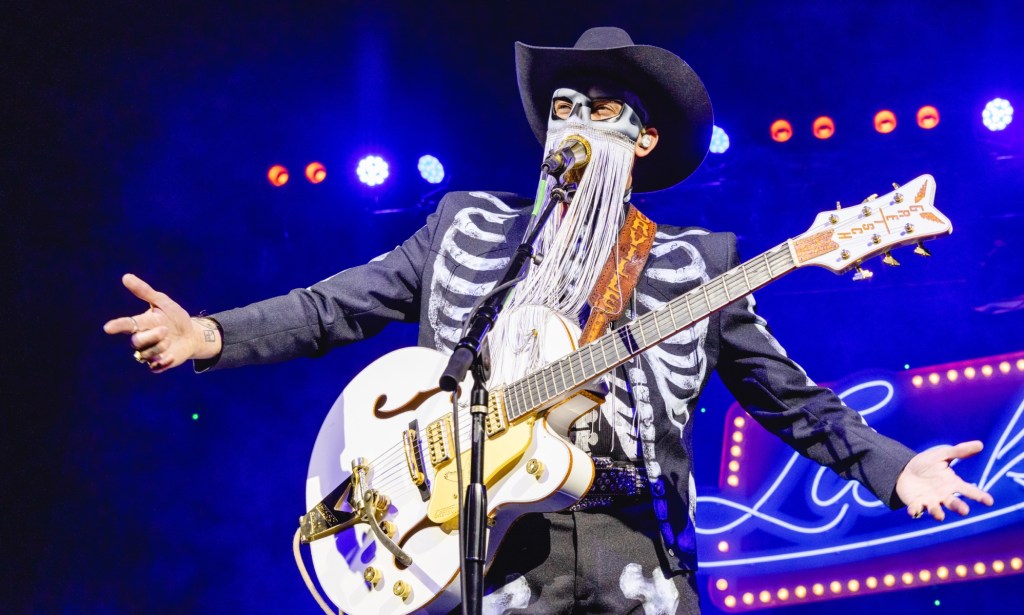Orville Peck says people ‘laughed in his face’ for being a gay country singer: ‘I kept my chin up’

Gay country star Orville Peck in new Apple TV+ show My Kind of Country (Apple TV+)
Country music sensation Orville Peck has spoken about the “very discouraging” experiences he suffered while trying to break into the industry as a gay man.
The South African artist is one of the talent scouts featured alongside fellow country singers Jimmie Allen and Mickey Guyton in Apple TV+’s new series My Kind of Country, in which a roster of exceptional up-and-coming artists compete to become the next global country star.
Despite the fact that the country music has birthed an extraordinarily diverse array of icons such as Dolly Parton, Lil Nas X, Patrick Haggerty and Cameron Hawthorn, with more and more country stars coming out as vocal LGBTQ+ advocates, the genre is still notoriously conservative – and for openly gay musician Peck, the journey to stardom has been anything but easy.
“A lot of people [were] practically laughing in my face, telling me that being an openly gay man in country would never work,” he told People while reflecting on the challenges he’s faced in the industry. “I’ve [had] very discouraging moments in my career.
“But I kept my chin up, and I refused to let anybody tell me that I couldn’t do what I wanted. If someone tells me I can’t do something, it makes me want to do it even more.”

The “Dead of Night” singer, who “grew up loving country”, has not been shy about incorporating elements of “theatricality” into his work – he’s known for wearing signature fringed masks.
“For me, I was obsessed with The Lone Ranger, cowboys hiding their faces, so that’s what I wanted to do. I wanted to mix really vulnerable personal music, which is what I write, with this theatricality and performance.”
Peck was drawn to the new show, which is produced by Reese Witherspoon and Kacey Musgraves, because he wanted to mentor those who felt held back or as if they didn’t fit in; a sentiment he shared with Allen and Guyton.
“I think the thing that was missing for all three of us was just that encouragement; just having a mentor or someone that had done what we were trying to do before us and could say, ‘Look, go this way, do this’. We didn’t have that. We had to really blaze our own trails. And as rewarding as that was — because I wouldn’t change anything about it — it would’ve been nice and helpful.
“I think that is what drew all three of us to this project and why we were so genuinely invested in these artists and passionate about these artists,” he continued. “Because we could see a piece of ourselves in each of them, and we wanted it to be easier for them than it was for us”.
Perhaps the closest Peck got to positive, affirming representation was listening to Shania Twain, whose music he used to dance to when he was a young teenager in South Africa.
“She’s a gay icon,” he enthused. “She’s a fashion icon. She’s always been an ally.”
Peck, who worked with Twain on his 2020 single “Legends Never Die”, also described how “the most beautiful thing” about the country star is her down-to-earth personality.
“She’s a very strong person,” he continued. “But she is very, very sweet and open and also a very defiant trailblazer in her own way. When she first came to Nashville, she had a lot of issues about her acceptance in country music.
“They didn’t like how she dressed. They didn’t like what she was singing about. She refused to be anything except this strong woman who wasn’t going to be subservient to men, and look at her now. She’s a global icon.”
The queer “Legends Never Die” music video featured Drag Race season 12 winner Jaida Essence Hall and Chicago queen Miss Toto Clermont.
Country music has been making a lot of noise recently when it comes to LGBTQ+ acceptance. Last week, Kelsea Ballerini took to the CMT country music awards stage with Drag Race stars in defiance of rising anti-drag attacks in the US, while singer-songwriter Maren Morris slammed anti-LGBTQ+ lawmakers at the Love Rising LGBTQ+ benefit concert.
How did this story make you feel?

